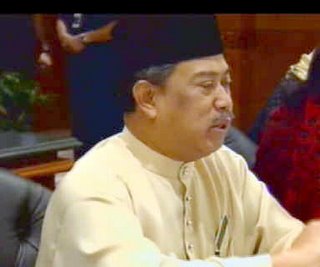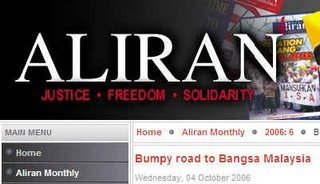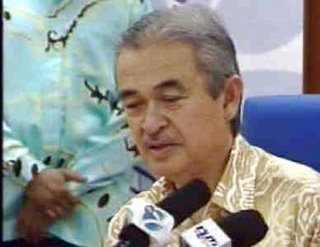= = = = == =
Update Oct 12 06, Extract via STAR Oct 12 06, Final word from
Mirzan Mahathir
Mirzan in his reply via e-mail said since Dr Lim had a different view
to Asli’s and he felt strongly about it, he was free to resign from his position based on principle. He said Asli was
not told to retract Dr Lim’s findings directly.
“We did an evaluation of the specific report and found it wanting. If its assumptions and calculations are faulty, we felt that the conclusions arrived at may also be faulty. As such, we feel that the report does not fairly reflect the true picture of bumiputra equity ownership in Malaysia,” he added. Mirzan also denied any political pressure to issue the statement.
= = = = == =
Update Oct 11 06,
DIRECTOR of ASLI Quits for Good
The following is Lim’s full statement
"Mirzan Mahathir, president of Asli, yesterday issued a press statement on the study conducted by the CPPS on 'Corporate Equity: Past Trends and Future Policy'.
The Asli statement was in response to various comments arising from the study's finding on the level of bumiputera equity ownership. As director of the CPPS, I take full responsibility, and stand by the findings of the study and the other studies that were submitted in our report to the government on the 9th Malaysia Plan in February 2006.
Since I cannot agree with Mirzan's statement, and because of the need to defend the position and integrity of independent and non-partisan scholarship, I regret to inform that I will be stepping down from my position as director at the end of the month.
I hope the public space opened up by the centre’s work on this particular, as well as other important, issues will be expanded on and vigorously defended by others. It is the fundamental right of the Malaysian public to question all government statistics and policies, more so when these are not transparent or defensible.
I would like to thank Asli for giving me the opportunity to work with it in providing service to the country."
Dr Lim Teck Ghee
Oct 11, 2006
Brief CV of Dr Lim T G

Lim is the first director of the Asli centre which was established in mid-2005 Lim, a PhD graduate from the Australian National University in 1971, has been a professor at the Institute For Advanced Studies, Universiti Malaya, before working as the regional adviser on poverty alleviation and social integration for the United Nations Economic and Social Commission for Asia and Pacific. He also once worked as a senior social specialist with the Environment and Social Development Sector Unit of the World Bank, and has published extensively on human resources and development issues.
= = = = == =end update
Update Oct 10 06, from Bernama; Under tremendous pressure from various quarters, ASLI Finally made a U-turn and 'retracted' the findings through its President, Mirzan Mahathir..
= = = = = = =
ASLI Admits Report Did Not Reflect The True Picture On Equity ; October 10, 2006 20:18 PM
KUALA LUMPUR, Oct 10 (Bernama) -- The Asian Strategy and Leadership Institute (ASLI) said today that a report on bumiputera corporate equity which had drawn widespread criticism did not fairly reflect the true picture of total equity ownership by bumiputeras in Malaysia.

Its president, Mirzan Mahathir, said that on re-examining the methodology and conclusions of the report, "Asli has concluded that there are shortcomings in assumption and calculation that led to conclusions that cannot be vigorously justified."
Mirzan also said that Asali deeply regretted the hurt and confusion felt by all Malaysians following the report by its Centre of Public Policy Studies on the bumiputera corporate equity ownership.
"As the 30 per cent ownership of Malaysian corporate equity by bumiputeras is one of the key targets of the NEP (National Economic Policy), it is important to have a reliable methodology to measure the government's success in meeting the target," he said in a statement here.
The centre's report that the estimated bumiputera equity ownership in public-listed companies might be as high as 45 per cent of total equity traded on the Malaysian bourse had been disputed by many. Prime Minister Datuk Seri Abdullah Ahmad Badawi, in commenting on the issue last Thursday, rejected the findings as baseless and inaccurate as several indicators used by the centre were irrelevant.
"This report and its reaction serve as a reminder of the unique qualities of our beloved nation. We humbly take all criticisms levelled at Asli with an open heart in our quest to improve ourselves in order to serve Malaysia better," Mirzan said. He said that in its 13-year history, Asli had never projected an agenda other than to help create a better society through the promotion of strategic thinking and leadership qualities.
Mirzan also said that the report was part of the centre's set of recommendations to the Malaysian government for consideration for the Ninth Malaysia Plan submitted last March. "The report has ignited public debate on the subject which we hope will lead to a better understanding of the merits of the current methodology. All methodologies are at best good estimates of the true situation and due to the importance of the threshold to the public, should be as transparent as possible," he said.
= = = = = and comments from from the Father Tun Dr Mahathir (extracted from Msiakini)

The aid extended to Malays cannot be stopped abruptly as it will lead to chaos and racial disputes, warned former premier Dr Mahathir Mohamad.
However, he said certain segments of the Malay community have been using the New Economic Policy (NEP) as a crutch. He said the NEP was never meant to be a permanent policy for the Malays to continue their dependence on government assistance.
According to him, although the NEP was drafted to help the Malays, the Chinese have also benefited from it.
Only a small portion of Chinese are against the policy, he said during a 'buka puasa' function organised by the Malay Chamber of Commerce in Kuala Lumpur last night.
'Illogical' study
Mahathir was responding to a study by local think-tank Asian Strategy and Leadership Institute (Asli) which stated that the bumiputera corporate equity ownership was around 45 percent, way above the 30 percent target set under the NEP.
Asli - which came under fire from various quarters over this study - was founded by Mahathir’s son Mirzan in 1993. He is currently the president of the think-tank.
Mahathir also dismissed Asli’s findings as ‘illogical’.
“If the Malays control 45 percent, this means they have more (equity) than the Chinese and other races. What kind of research has Asli done? It does not make sense.
“The (Asli) figures are for the corporate sector (only). The ownership of shares by the Malays is at 18 percent. We cannot evaluate the source of wealth from other things,” he added. Mahathir said the study did not take into account land ownership and changing market values.
“Can we compare the price of one acre of land in Kuala Lumpur to the paddy fields in villages? In Kuala Lumpur, land cost RM1,000 per square feet but an acre of paddy field land can cost thousands,” he added.
Doctors and mat rempits
Asked if the aim of the study was to prevent the Malays from obtaining aid from the government, Mahathir said: "Yes, the purpose is to so that the Malays are not fed by the NEP. But we (the government) have compromised, we have reduced it, including (the quota system) in universities."
"But the Malays should not always depend on the government. But if we end the NEP, there would be chaos, and chaos would not benefit anyone including Asli,” he added.
Commenting on the Penang Chinese Chamber of Commerce’s (PCCC) call last week for the abolition of the 30 percent bumiputera quota in housing and commercial projects, Mahathir said this was an isolated view.“That is just the view of one group, it is not the general opinion. Most Chinese do not oppose the NEP, they support it,” he said.
Mahathir also said the Malays must learn to help themselves and not depend on the government. “If we give them the opportunity to enter university, they don’t want to enter. That’s why only 30 percent of (Malay) males are in universities. If seems that it is the women who are studying hard.
“The men don’t do anything, (they) sit and mat rempit (daredevil bikers). They ride their motorcycles and they can stand on the seats,” he added. Quizzed on the allegation that the NEP has only benefited those with the proper connections, the former premier said he has been asked this question numerous times.
“Forty percent of doctors are Malays, whereas in the past it was only two percent. We have PNB (Pemodalan Nasional Bhd), Malays make up the bulk of its investors,” he said.
Million-ringgit contract
Mahathir said the government introduced the NEP in 1971 to improve the Malays but many had ‘betrayed’ it to the point that “Mat Salleh (foreigners) say Malays cannot do business.” Through the NEP, he said, Malays received Approved Permits (AP), Class F contractor licenses and contracts in order to upgrade their economic status.
“But the Malays sell the APs, the licenses and contracts. They sell everything the government gives them ... they don’t do their work properly. “The Malays are not committed to the point that the Mat Salleh labels the 'orang kulit sawo matang' (brown-skinned people) as those who do not know how to do business.
“... When the Mat Salleh says something, we just nod. The Mat Salleh gets angry when you talk about cronies, but we welcome it,” he added. Mahathir also claimed that a trishaw rider had obtained a million-ringgit contract. “What is he going to do with a million-ringgit contract. He has to give it to someone who knows what do to with it.”
= = = = == = end update
 Umno vice-president Tan Sri Muhyiddin Yassin: "The report may have an agenda that aims at forming a polemic among those who believe the report to be true"
Umno vice-president Tan Sri Muhyiddin Yassin: "The report may have an agenda that aims at forming a polemic among those who believe the report to be true"
= = = = == =
Update Oct 9 06, extract from STAR Oct 9 06
Mingguan Malaysia reported that Umno vice-president Tan Sri Muhyiddin Yassin wanted the Asian Strategic and Leadership Institute (Asli) to retract its 45% bumiputra equity ownership estimation”.
Muhyiddin said the report was a challenge to the Government’s integrity and described the report as irresponsible and “rubbish”. He said the Government should take action against Asli if it failed to retract the report.
He said Asli should also admit that the report was wrong to prevent a polemic that would affect racial unity. “The report is rubbish and cannot be used. As a Malay, I am angry and I think it was done with malice.
“The report may have an agenda that aims at forming a polemic among those who believe the report to be true. They will definitely blame the Government for revealing the wrong facts,” he said.
Defination of polemic - A controversial argument, especially one refuting or attacking a specific opinion or doctrine.
= = = = = =end update
Now what is the truth of the matter between 18.9 % or 45 %. The belief systems that are strongest to us individually, we would call that a truth. You express it each day within your focuses. You associate with it continuously. Many of your automatic responses are associated within yourselves as truth.
What we are witnessing now within our world are two group of individuals who express their truths and their differences in their truths, and there is no bending basing on their own perception. For you do not question your own truths, and therefore they must be absolute and all other individuals must accept them, for your truth is THE truth and another individual’s truth is wrong, and it is questioned, a polemic. they call it.
The facts and figures do not matter. When can they get enlihghtened to see the truth under a coconut tree and not a bodhi one?.When more accurate and acceptable facts are used, people would still hold on to their beliefs and establish their own truths based on their perceptions.
= = = = = = = = end comments
 Datuk Seri Abdullah Ahmad Badawi: "The findings are inaccurate as several indicators they used were irrelevant"
Datuk Seri Abdullah Ahmad Badawi: "The findings are inaccurate as several indicators they used were irrelevant"
Asli Findings On Bumi Equity Stake Baseless, Says Abdullah; October 05, 2006 20:16 PM
PUTRAJAYA, Oct 5 (Bernama) -- Datuk Seri Abdullah Ahmad Badawi Thursday disputed study findings by the Asian Strategic and Leadership Institute (Asli) that Bumiputeras hold 45 per cent equity in the country's economic pie.
Rejecting the findings as baseless, the Prime Minister said the study only covered 1,000 companies.
"The findings are inaccurate as several indicators they used were irrelevant.
"I was told their findings were based on a survey involving only 1,000 companies," said Abdullah, who is also Finance Minister, after chairing the Fifth National Implementation Task Force meeting Thursday.
Instead, the prime minister said information and related government documents received from the Economic Planning Unit in the Prime Minister's Department for tabling of the Ninth Malaysia Plan gave the actual equity ownership of the Malays, he said.
"They're more accurate as these are government documents and EPU information covered 600,000 companies. That's a very big base (600,000 companies)," he said. Bumiputera equity ownership is about 18 per cent.
Abdullah compared Asli findings -- 45 per cent Bumiputera equity ownership to the actual equity held by Bumiputeras in nominee companies.
Information obtained from EPU showed of the more than 300 nominee companies in the country, 60 per cent of them were owned by non-Bumiputeras compared to 13 per cent Bumiputera-owned.
He said the baseless Asli findings could result in adverse reactions on the position of the non-profit organisation as the government's "think-tank".
Abdullah said the researchers' move to base findings of their survey on information from unauthentic sources can also be considered as an irresponsible act.
He also said the assumption that government-linked companies (GLCs) were actually Bumiputera-owned was not true and whoever think so was wrong.
He said profits made by GLCs were channelled to the Treasury as "Consolidated Fund" and the money is used to finance development projects for the benefit of all races.
Abdullah also said the Cabinet, in its weekly meeting Wednesday, endorsed his stand on the reply by Singapore Minister Mentor Lee Kuan Yew over his remark that Malaysian Chinese are being systematically marginalised.
Local newspapers today quoted Abdullah as saying he rejected Lee's reasons for making the remark.
The Prime Minister said though he took note of the contents, whatever reason given by the Singapore founding father for his remark, was smack of sedition and could incite the feelings of Malaysian Chinese.
On the National Implementation Task Force meeting, Abdullah said the relevant ministries unanimously agreed to speed up implementation of new development projects in rural areas under the Ninth Malaysia Plan.
The Education Ministry, for instance, had issued tenders for 50 projects in rural areas, he said, adding that the number of projects would increase to about 200 by year-end.
= = =
October 05, 2006 21:39 PM Plans To Meet Bumi Equity Target Will Not Affect Non-Bumis - Najib
KOTA BAHARU, Oct 5 (Bernama) -- Datuk Seri Najib Tun Razak Thursday reiterated his assurance that the government's efforts to realise the Bumiputera equity target will not be at the expense of non-Bumiputeras.
The Government needs to give attention to strike a balance but it would not be at the expense of non-Malays, the Deputy Prime Minister said when queried on the findings by the Asian Strategic and Leadership Institute (Asli) that the Malays now controlled 45 per cent of the country's economic wealth.
Earlier, Najib, who is also Umno deputy president, chaired the Kelantan Umno liaison committee meeting.
Najib said the Government did not want this issue to be turned into a big polemic because in reality the Bumiputera equity ownership was still relatively small.
"This is because the statistics used by Asli researchers are based on the average value. If we use other indicators, probably it will show that companies reaping big profits will have a higher share value than low-performing ones," he said.
On Asli researchers citing as examples that some government-linked companies (GLCs) were not wholly-owned by Bumiputeras, Najib said GLCs have certain positions and specific roles.
Prime Minister Datuk Seri Abdullah Ahmad Badawi disputed the findings, saying it was baseless that Bumiputeras currently hold 45 per cent equity in the country's economic pie.
= = =
 Deputy Prime Minister Datuk Seri Najib Tun Razak: "allocations pledged under the 9MP would be disbursed effectively"
Deputy Prime Minister Datuk Seri Najib Tun Razak: "allocations pledged under the 9MP would be disbursed effectively"
Government To Ensure 9MP Will Benefit All Malaysians; October 05, 2006 21:57 PM
KOTA BAHARU, Oct 5 (Bernama) -- The government will ensure all Malaysians will benefit from the Ninth Malaysia Plan (9MP), said Deputy Prime Minister Datuk Seri Najib Tun Razak.
He said the government's main agenda in the 9MP was not the mega projects alone but the holistic approach that would extend the plan's benefits to all Malaysians.
"That is why the government is bold enough to state that by the end of the 9MP in 2010, the hardcore poor will no longer exist in Malaysia," he said at a gathering to break fast with Umno Kelantan leaders and orphans here Thursday. Najib was accompanied by his wife Datin Seri Rosmah Mansor.
Also at the gathering was Umno Kelantan chairman Datuk Seri Annuar Musa, Higher Education Minister Datuk Mustapa Mohamed and Deputy Finance Minister Datuk Dr Awang Adek Husin.
Najib said the leadership would ensure all the allocations pledged under the 9MP would be disbursed effectively, including to Kelantan although it is controlled by the opposition.He said Prime Minister Datuk Seri Abdullah Ahmad Badawi did not discriminate against the state and instead was adopting a sensitive and open approach on its development needs.
"The allocation under the 9MP for Kelantan is higher by two-fold compared with that provided under the 8MP. We are giving a strong signal under the 9MP that the nation's aspiration is not a dream or mere political gesture," he said.
At the gathering, Najib presented Raya gifts to 65 senior citizens and 135 orphans.
= = =
from MSIAKini, Letter
Economist’s basis of calculation erroneous; Khoo Kay Peng; Oct 5, 06 7:39pm
Dr Zainal Aznam Yusoff’s skepticism of Asian Strategy and Leadership Institute’s view that the bumiputera equity ownership is 45% was not supported by convincing counter arguments. His response in the New Straits Times has created doubts about his real motive because a truly professional economist like himself would not have made such weak technical arguments.
Firstly, Zainal argues that Asli’s use of the 1,000-odd companies listed on Bursa Malaysia is not indicative of the actual equity ownership situation. This is linked to his subsequent argument that Asli’s use of market capitalisation is wrong. Instead, he insisted that the calculation should be made on the basis of the number of shares held, or the par value.
It is unfathomable for someone who is a leading economic advisor to the government for failing to understand the simple logic of calculating wealth on the basis of market capitalisation, or the market value. In this regard, Zainal indicates that the value of holding a unit of Tenaga share is equivalent to a unit of a small-medium entreprise share.
More than 90% of all companies registered in Malaysia are small-medium enterprises (SMEs). Almost 75% of all the SMEs are either owned or controlled by Chinese Malaysians. However, the SMEs are responsible for less than 10 percent of the nation’s gross domestic products.
Using the par value as a basis of calculation is erroneous because it does not indicate the real level of wealth ownership, which is a better indication of economic well-being. Hence, this explains why the stated bumiputera ownership is at a low18.9% although the actual ownership of wealth could have been as high as 45% or more.
Zainal’s argument leads to more questions. What is the real motive of using the par value as a basis of calculation? Is the government trying to hide the fact that the affirmative policy has benefitted and enriched only a few people and left many stranded under the jaws of poverty? Who control the majority of the wealth attributed to the bumiputera community?
If the New Economic Policy (NEP) has been a great success, what has contributed to the contraction of the income pie of the lowest 40% of the society? The drop of almost 2%, from 15% to 13%, is recorded in the Ninth Malaysian Plan. The richest 20% has expanded their wealth by almost the same quantum. Is the government trying to hide from the fact that it has failed to build a bumiputera commercial and industrial community, to expand the individual/private bumiputera's participation in the economy?
Perhaps Zainal is worried that if the market value is used as a basis of calculation, the government may be facing a difficult time in trying to explain to the truly marginalised segment of the society, which consists of largely the bumiputera community, why the 45% of wealth ownership did not help to alleviate their living conditions.
Secondly, Zainal alleges that Asli had included all ownership by government-linked companies (GLCs) into their estimation as bumiputera. The government has removed GLCs from its figures. Asli had estimated 70% of GLCs ownership as bumiputera. The institute argues that this is done from their observation of the procurement contracts and projects awarded to bumiputera companies.
It is a fact that GLCs are used to support and implement the pro-bumiputera public procurement policy. In the recently announced regional economic corridors, the GLCs are tasked with the development of the economic zones with an objective to increase the participation of bumiputera companies in the economic sector.
All GLCs have made it mandatory to deal with only bumiputera majority-owned companies. The boards of these companies are made up of almost 85% bumiputera directors. The employee composition of the GLCs also reflect similar trend. Hence, it is difficult for anyone to justify that these GLCs represent our national interest.
I have two additional questions for Zainal. First, since he supported the use of par value as a justified method of calculation, would he be willing to propose to the government to swap one Tenaga share for two Farlim shares, as an example? This way the bumiputera community will be able to double up their number of share holding almost immediately.
Second, is he willing to propose to the government to restructure the GLCs to truly represent the interest of our multiracial nation? For the GLCs to be truly representative, they should open up their tender process to all Malaysian companies.
Finally, I echo Zainal’s sentiment that the government should come out with a more accurate, credible and sensible method to calculate the ownership of wealth in the country. This must be done with a genuine interest to address the continuous marginalisation of the poorest 40% of our society, which consists of Malaysians of all communities.
A clearer picture of the wealth ownership can be used to assist the government to combat corruption and to go after individuals and rent-seekers who have enjoyed the forbidden fruits of nepotism and corruption.
Zainal’s respond to my questions will determine whether he is an apologist of the corrupt elites or not.
= = = = = =
RESPONSE From Asli's Centre for Public Policy Studies (CPPS) director Dr Lim Teck Ghee (in FULL below)
The CPPS would like to take the opportunity to respond to various comments on its recent study on the corporate equity issue.
Firstly, the study was undertaken by a multi-racial group of scholars andconsultants as part of work in connection with the Ninth Malaysia Plan. Itwas submitted to the prime minister, cabinet ministers and other government leaders in February 2006 as part of a bigger report which included findings of studies on education, the civil service, low-income communities andPenan.
Following initial release of the report to the government, the report was made widely available to various political, social and economic bodies in the country The corporate equity study was based on a combination of primary and secondary research. The study found that the official methodology for computation of corporate equity distribution - first used in the 70s and continued till today - is narrowly based, unrealistic and has resulted in an underestimation of the true volume and value of bumiputera equity.
Using alternative methodologies, the study has estimated that the bumiputera corporate share is considerably higher than the official figure of 18.9 percent in 2004 - in fact it may be as high as 45 percent. This is because, besides the original listing requirement of 30 percent, the bumiputera share has been considerably augmented by that held by government-linked companies (GLCs), which are among the major holders of equity in corporate Malaysia.
Other findings of the study are that the government has played an effective role in redistributing wealth more equitably among all Malaysians. The study also provides evidence of one important new development, that is, the emergence of business partnerships forged along inter-ethnic lines.
A number of these partnerships comprise bumiputera from the newmiddle-class, created through their access to human development opportunities that has provided them with skills in the corporate sector.
The emergence of such inter-ethnic partnerships, most of which started as small and medium-scale enterprises (SMEs), was not fostered through government directive. These partnerships were based on the coming togetherof business people in endeavours where each partner has contributed to the development of the new enterprise. The rise of such inter-ethnic
partnerships augurs well for the promotion of national unity in Malaysia.
The study concludes that the focus of the government on racially-based affirmative action programmes to redistribute wealth is misplaced and is eopardising economic growth. It is clear that selective patronage has resulted in serious intra-ethnic Malay cleavages, while also undermining inter-ethnic social cohesion and equitable socio-economic development for
the country as a whole.
Let's talk
The focus of the government should be on policies that transcend a racial dimension and which address issues from a structural perspective. The study recommended that for the Ninth Malaysia Plan, the government should focus on promoting the development of SMEs, where genuine entrepreneurial capacity is to be found and encouraged.
The centre welcomes the opportunity to discuss its findings with other non-partisan bodies and individuals. The centre also hopes that the findings of the study and the larger report (several chapters focus on marginalised
Malaysian communities) can generate thoughtful and rational discussion on the country's social and economic development strategies. In this connection, we would like to point out that casting aspersions and questioning motives based on race is not helpful. In particular, we are concerned with the comments attributed to Prof Shamsul Amri Baharuddin.
Using his own logic which questions the ethnicity of those involved in thestudy, it would appear that all government data/studies (and his too) cannot be taken seriously because they are undertaken by a Malay bureaucracy or academics to promote a particular Malay agenda.
Dr Lim Teck Ghee; Director, Centre for Public Policy Studies
= = = = = = = =
Conflicting percentage of Bumiputera equity ownership raises questions
28 Sep 2006 Koh Lay Chin
KUALA LUMPUR: What exactly is the extent of Bumiputera equity ownership? Economist Datuk Dr Zainal Aznam Yusof is unhappy with the 45 per cent cited by the Asian Strategy and Leadership Institute, saying the Government's 18.9 per cent was accurate.
And the primary flaw in Asli's assessment? The think tank did not spread the net far enough to exact precise details.
Zainal Aznam says the Government used a whole gamut of information from the Registrar of Companies and the Companies Commission while Asli used sources such as the UBS Equity Research Malaysia 2005 Report.
He argues that Asli used 1,000-odd companies listed on Bursa Malaysia to substantiate its findings while the Government used information from over 600,000 companies nationwide.
“Which do you think is more reliable? That is one major weakness of the Asli study. It is a small sub-sample of the total number of companies in Malaysia."
Another weakness in the Asli study is the fact that it considered Government-linked Companies as predominantly Bumiputera while the Government removed GLCs from its figures.
A third flaw was Asli's use of market capitalisation while the Government used the par value, or nominal value, and the number of units of shares a person held.
= = = = = = = = =
 ( along read..)
( along read..)
Bumpy road to Bangsa Malaysia
Wednesday, 04 October 2006
Ethnic-based economic policies will undermine the objective of promoting national unity, warns Terence Gomez.The problem of growing intra-ethnic inequalities is evidence enough that government policies should be aimed at helping all groups in need, regardless of race.
In his appointment as prime minister, Abdullah Badawi declared his intent to promote a 'Bangsa Malaysia' and to reform the economy. Few Malaysians doubted his sincerity, as was evident in the Barisan Nasional's subsequent resounding victory during the 2004 general elections. But the much-anticipated Ninth Malaysia Plan (9MP), Abdullah's first blueprint for moulding a new Malaysia, characterised by a 'developed and united nation.confident in its own capabilities', has been widely acknowledged as a disappointment.
A number of grounds have been cited for this disappointment. But the primary flaw with the 9MP is that it appears to be inspired by a Malay - or an UMNO - agenda, rather than a vision that would serve ultimately to unify a country that, if recent polls are correct, is still deeply divided along racial lines.
There are other criticisms that can be made about the 9MP. The first problem is that Abdullah remains convinced by two ideas that have long characterized policy planning of an UMNO-led government. First, that sustained economic growth is fundamental to resolving social inequities in Malaysia. And second, that through its policies, the government can achieve its different goals, with few trade-offs. For example, the government believes that it can simultaneously promote social cohesion and Bumiputera capital without jeopardising either endeavour.
The second major problem with the 9MP is that, while former Prime Minister Mahathir Mohamad was obviously fixated with the idea that the solution to sustained economic growth was private sector liberalisation and privatisation, Abdullah's major policy recommendations also conform with this idea - although he originally appeared to be somewhat of a different bent. The 9MP does include the reforms proposed by Abdullah when he rose to the premiership. But the Plan's economic recommendations remain largely couched within the framework of previous policies that have resoundingly failed to achieve their objectives.
Growth and equity
The major economic policies proposed by the Mahathir administration included rivatisation, the promotion of Bumiputera capitalists, and the creation of Malaysian onglomerates. With the exception of the need to support the rise of conglomerates, the 9MP persists with the other two policies.
The failure of privatisation, which was clsely linked to the promotion of Bumiputera capitalists, is now well recorded. The re-nationalisation of major projects - such as the Bakun Dam and the national sewerage project, and the government's decision to acquire control of major privatized enterprises such as Malaysia Airlines, Celcom, and United Engineers (M) (UEM), which operates the North-South Highway - are outstanding examples of such costly mistakes. There is little evidence to suggest that privatisation has improved efficiency, nor has the private sector shown the capacity to finance projects involving a high capital outlay. Furthermore, implementation of privatisation has been replete with allegations of favouritism, nepotism, and patronage involving business people closely aligned to UMNO leaders.
One of UMNO's major objectives has long been the creation of a new breed of dynamic Bumiputera entrepreneurs, known in policy terms as the 'Bumiputera Commercial and Industrial Community' (BCIC). The BCIC continues to be promoted in its original form with only one substantial change: there is now a new emphasis on small - and medium-scale enterprises (SMEs), a sector largely ignored by Mahathir. The 9MP insists that the BCIC will serve as the primary mechanism for ensuring greater Bumiputera participation in the economy, though it is also supposed to aid the government's endeavour to restructure society and eradicate poverty. To achieve these goals, the government's methods include the promotion of Malaysian-type industries, such as the production of batik and songket. This is an innovative idea as it helps draw attention to potentially lucrative cottage industries, dominated by poor and rural Bumiputeras. Similarly, the 9MP will attempt to encourage focus on Islamic-type products, for example, by developing a niche market in halal food. Enterprises in this sector, the government believes, will be able to create export capacity if well developed.
These new industries promoted by the government to encourage Malay capital and eradicate poverty are novel. But the BCIC, now nearly two decades into its implementation, has failed to advance the rise of an independent Bumiputera business community. This is evident in the government's own figures on the number of businesses in key sectors of the economy owned by Bumiputeras.
Entrepreneurship
One solution to this problem has been the establishment of the Institut Keusahawanan Negara (National Entrepreneurship Institute) as a means to help train the young and to cultivate entrepreneurs. It is extremely doubtful, however, if entrepreneurship can be nurtured through the sort of training provided by such institutes. More importantly, the poor state of Malay capital in the country reflects the inability of government institutions such as the Entrepreneur Development Ministry to cultivate new entrepreneurs - a lesson that has not yet dawned on the government.
By continuing to focus primarily on the promotion of Bumiputera capital and the creation of a new breed of competent Malay business people, the 9MP has missed the opportunity to create alternative mechanisms for promoting domestic capital and entrepreneurship in Malaysia. By persisting with the BCIC, the government is reinforcing an old problem - the bypassing of potentially lucrative entrepreneurial ventures, merely because these do not involve Bumiputeras. Moreover, if the government hopes to build domestic entrepreneurial capacity, it cannot afford to continue to marginalise the most dynamic businesses. The government is also now probably well aware - based on the experience of having implemented the New Economic Policy (NEP) and witnessing the rise of Ali-Baba firms - that inter-ethnic business partnerships, forced or coerced into being by the dictates of policy, are simply not going to be sustainable.
To help nurture and develop small firms, the only new major recommendation in the 9MP is the establishment and active promotion of the SME Bank. The reason SMEs have not been able to develop in a manner that equips them with export capacity and the ability to develop brand products is not their inadequate access to loans. These deficiencies prevail among SMEs primarily because they have not invested adequately in research and development (R&D).
It is also well known that many SMEs owned by the Chinese are reluctant to approach banks for loans for fear of the need to divulge information that they feel can be used to their detriment. Cash flow-based funding by the SME Bank, as is being recommended by the government, is in itself an inadequate measure to help promote the rapid development of a vibrant SME sector. Vendor system
Another policy mechanism that has long been implemented with little success and now repeated in the 9MP is the use of the vendor system. In this case, however, the government plans to tie SMEs to large-scale enterprises and government-linked companies (GLCs), to help small firms gain greater access to the market. The government has also encouraged companies which produce disposable goods to market them through hypermarkets, most of which are controlled by foreign firms. One drawback to this recommendation is that it could stifle foreign investment.
The vendor system was a core component of Malaysia's car project, Proton. To promote Bumiputera enterprises, firms owned by members of this community were chosen to supply Proton with locally produced goods for the national car. This vendor system was not, however, successful in developing the rise of Bumiputera firms in the car industry. Neither did it help ensure that Proton model cars were equipped with quality material produced at affordable rates, ultimately undermining the national car project. The Proton vendor system suggests that an attempt to anchor fledgling firms on to established enterprises may end up only weakening the prospects of the latter.
Reforming GLCs
Apart from the promotion of SMEs, the 9MP's other major departure from the Mahathir administration's approach is Abdullah's attempt to utilise the GLCs more efficiently to generate economic growth. Reform of the GLCs is imperative as one outcome of the failure of privatisation was the use of government-owned entities to acquire failed privatised enterprises. The GLCs are currently among the major shareholders of a number of Malaysia's leading listed firms, including utilities such as TM (Telekom Malaysia) and power supplier Tenaga Nasional; the country's leading banks, Malayan Banking and Bumiputra Commerce Bank; the national oil corporation Petronas' gas producer, Petronas Gas; the national shipping line Malaysian International Shipping Corporation (MISC); and well-diversified Sime Darby.
Reform of the GLCs through the mere introduction of key performance indexes (KPIs) is, however, not sufficient to get them to perform efficiently and resourcefully in the economy. The question of the pattern of control of the GLCs is one that is crucial. One persistent criticism of the GLCs is that the professionals appointed by the government to manage these firms have reputedly little autonomy when it comes to decision-making on major matters.
This issue of control is also significant as there have been persistent allegations of interference by senior or influential politicians in the running of the GLCs. Since the government owns and controls the GLCs that have an enormous interest in companies quoted on the Bursa Malaysia, an independent watchdog would need to be established to ensure that these firms are independently and professionally managed. This would also help the government counter allegations of abuse of the GLCs for the vested interests of influential politicians. Ethnic relations and wealth inequities
While the 9MP espouses the goal of unifying the nation, it continues to perpetuate a discourse on equitable wealth distribution along racial lines. For example, on the issue of wealth disparities, the 9MP expresses concern that the Chinese have twice the volume of equity owned by Bumiputeras. The Plan does not, however, go on to explain why this is the case even though affirmative action has long been instituted to achieve wealth parity among all ethnic groups.
A number of reasons can be cited for this disparity in wealth between these two communities. These include the decline of Bumiputera capital following the 1997 currency crisis because of their over-dependence on loans to finance growth, the failure of privatisation to promote Malay-owned enterprises, and the re-nationalisation of conglomerates controlled by Bumiputeras. The government also fails to note a point that Mahathir recognised and acknowledged rather belatedly during his long tenure: that the Chinese have continued to thrive in business in spite of the NEP because they have persistently been exposed to the rigours of competition. The emphasis of the 9MP should have been on exposing Bumiputera-owned firms to competition, to enable them to hone and secure the skills they need to survive independently.
Although the 9MP maintains that the Bumiputeras are still a long way off from attaining the NEP goal of owning 30 per cent of Malaysia's corporate equity, the government's figures on wealth distribution can be disputed. For example, individual Bumiputeras and the government were said to own 51.7 per cent and 31.2 per cent respectively of privatised entities, which would presumably include firms like TM, Tenaga Nasional, and MISC, at the end of 2005. Non-Bumiputeras, on the other hand, owned only 8.9 per cent of such equity. Since the government holds this equity on behalf of Bumiputeras, thetotal volume of privatised firms attributable to this community would amount to a colossal 82.9 per cent. Yet, the Plan also insists that the volume of corporate assets owned by Bumiputeras has not increased from 19 per cent between 2000 and 2004.
It is also odd that even though the GLCs are majority shareholders of the largest companies quoted on the Bursa Malaysia, it is the non- even more than that owned Bumiputeras who are listed as owning more equity than the Bumiputeras. The 9MP also states that nominee companies own a massive 8 per cent of corporate equity,by Bumiputera institutions, which hold only 2.2 per cent of such wealth. Numerous studies have noted that well-connected business people, politicians, and political parties use nominee companies to shield their ownership of corporate equity from the public view. If the government now claims to advocate a more open and transparent corporate
system, it tarnishes this assertion by continuing to retain and permit the practice of using nominee companies. While the government maintains that non-Bumiputeras, in particular the Chinese, own more than double the equity attributed to Bumiputeras, the
perception among non-Malays is that they have little control over the economy. Non-Bumiputeras also harbour insecurities about property rights over their assets. This is a serious problem because such perceptions and insecurities will ultimately lead to lost opportunities for the government to promote the rise of dynamic domestic entrepreneurs who can drive economic growth.
As for the ethnic Indian community, the government has noted that its ownership of equity has not increased in any appreciable manner since 1970. The 9MP now proposes to ensure that this community will come to own 3 per cent of total national wealth within the next decade. The government's continuing fixation with figures like 3 per cent for Indians and 30 per cent for Bumiputeras is baffling. Even if the government achieves its target of Indian ownership of 3 per cent of corporate wealth, it is highly unlikely that this equity will be evenly distributed among all members of this community. In the case of the Bumiputeras, one outcome of their increased ownership of corporate wealth, from 2.4 per cent in 1970 to 18.9 per cent in 2004, has been the creation of a serious intra-ethnic class difference. The government appears unaware or unwilling to accede that ethnically based
corporate ownership figures such as 3 per cent or 30 per cent mean little or nothing in terms of ensuring equitable wealth distribution for Malaysians.
These figures in the 9MP also reveal that the government remains convinced that it can develop Malay capital, eradicate poverty, and achieve national unity simultaneously. It is highly unlikely that these objectives can be achieved concurrently, especially if there are policies favouring one community over the other.
Good governance and 'Bangsa Malaysia'
The issues raised here, such as the manner of privatisation, the limited independence of the GLCs' executives, and the use of nominee companies indicate that one issue that needs serious consideration is form of governance. According to the 9MP, 'good governance' will be encouraged through a review of legislation and by establishing new institutions. Abdullah's administration has shown a proclivity for establishing institutions to deal with a whole gamut of issues, including promoting entrepreneurship, improving quality of education, and instilling integrity in governance.
These institutions are, however, an inadequate - even unnecessary – response to the problems that the government faces in dealing with the poor quality of trepreneurship, declining education standards, and rampant corruption in the country. If the government hopes to create a more open and accountable government, there must be devolution of power to agencies such as the Anti-Corruption Agency (ACA) and the Securities Commission (SC) to allow them to act autonomously. The media must be liberalised and oppressive laws such as the Internal Security Act (ISA) and the Official Secrets Act (OSA) must be repealed. Malaysians cannot be expected to take seriously the government's pledge to enforce transparent and accountable governance when power remains concentrated in the office of the executive arm of government.
The 9MP devotes one chapter to creating an 'efficient public service delivery system', a clear acknowledgement of the decline in the quality of the civil service. While the government acknowledges the difficulty it faces in terms of institutional capacity to enforce policies, it appears that the mechanism to deal with this problem is greater oversight over the performance of public servants. But the pledge that the 'big stick' will be wielded if the civil service does not perform cannot be the solution. The reasons for the noticeable drop in the quality of public service over the past two decades need to be honestly assessed if the government hopes to improve its delivery system.
Towards Bangsa Malaysia?
As for ethnic relations, the 9MP reveals little about how the government hopes to create a 'Bangsa Malaysia', one of its key missions. Neither does the Plan appear to create a sense of opportunity for all even though the government claims otherwise. The primary assumption appears to be that if wealth and income are more equitably distributed between all communities, it will then not be difficult to foster national unity. Although this is not explicitly mentioned in the Plan, the government believes that until economic parity between communities is attained, affirmative action will remain a major prerequisite in the implementation of its policies.
For this reason, the 9MP comes across as a Plan that has been framed along racial lines, reinforcing the point that policies are largely conceived and implemented based on (political) consideration of the needs of particular ethnic groups. This ultimately undermines the professed objective of creating a 'Bangsa Malaysia'. The government should be reminded that the issues of nation building and sustainable economic development are closely inter-related and remain inter-dependent on each other. The 'brain drain' problem and the limited capacity of domestic enterprises to compete
internationally are some of the repercussions of the long-standing implementation of policies that favour one ethnic community over others.
The problem of growing intra-ethnic inequalities, especially serious among Bumiputeras, is evidence enough that government policies should be universal in orientation, developed to help groups in need, regardless of race.
Universal-type policies, rather than those that target specific ethnic groups, are also necessary if the government hopes to inspire confidence in all Malaysians that they belong to this nation. Affirmative action, while important and justified when introduced in 1970 to rectify social injustices, can no longer play a vital role along racial lines in helping to promote national unity and identity. The government's promotion of a unified
'Bangsa Malaysia' will only succeed if all Malaysians truly and genuinely believe that they are equal members of their nation.
Terence Gomez, formerly at the Faculty of Economics, University of Malaya,is now on secondment as Research Coordinator with the United Nations Research Institute for Social Development (UNRISD) in Geneva.
____
The PM starts off nicely] with "don't be partisan"... but then follows it up with "the best opportunity for us to fight for the good of the race and....". Does not quite jive, O Pak Lah... Perjuangan demi negara vs perjuangan demi bangsa.
 Datuk Seri Abdullah Ahmad Badawi : "As Muslims, we must look at politics as the best opportunity for us to fight for the good of the race and country"
Datuk Seri Abdullah Ahmad Badawi : "As Muslims, we must look at politics as the best opportunity for us to fight for the good of the race and country"
______________________________________
Don't Be Partisan, Says Abdullah
October 03, 2006 22:15 PM
KUANTAN, Oct 3 (Bernama) -- Datuk Seri Abdullah Ahmad Badawi wants Umno members to focus on charity work and helping the needy instead of being partisan during the holy month of Ramadan.
"(By not being partisan), God willing, our political party will last. If the party is busy with politics only...partisan politics, we may not get anywhere," the prime minister and Umno president at a breaking of fast organised by the Pahang Umno liaison body at Masjid Kipsas, here Tuesday night.
Present were Deputy Prime Minister Datuk Seri Najib Tun Razak, Pahang Menteri Besar Datuk Seri Adnan Yaakob, Umno Youth head Datuk Seri Hishammuddin Tun Hussein, Umno secretary-general Datuk Seri Mohamed Radzi Sheikh Ahmad and Umno information chief Tan Sri Muhammad Muhamad Taib.
"As Muslims, we must look at politics as the best opportunity for us to fight for the good of the race and country. "I believe that one of the things that make Umno strong is that we don't forget them (the people). This has never happened and we will remain in their hearts," Abdullah said.
He said the Ramadan month should be used for charity work to get God's blessing. Victory in Islam did not mean victory in war but victory in fighting poverty, illiteracy and ignorance, he added.
He also wanted Umno members to curb their desires, be good to their fellow men and step up cooperation with one another during Ramadan. After breaking fast, Abdullah performed the Maghrib, Isyak and Tarawih prayers before returning to the federal capital. –
= = =
Call to abolish 30pc Bumi quota in housing and commercial projects
04 Oct 2006
GEORGE TOWN: The Penang Chinese Chamber of Commerce has called for the abolition of 30 per cent Bumiputera quota in housing and commercial projects, as proposed in the Penang Structural Plan draft.
Its honorary president, Tan Sri Tan Kok Ping, said the chamber would push for the state government to omit the quota requirement from the draft plan, which was now on display for public comments.
"We cannot continue fixing quotas as it would make us less competitive.”We have to ensure equal opportunities are given to all, irrespective of race." He said the chamber planned to meet the state government to discuss the matter soon.Tan said the quota system had been around for a long time but it should no longer be implemented in a rigid way.
"If it is enforced in a rigid way, as is stated in the draft plan, property developers will have a tough time fulfilling the criteria."As it is, they are already facing problems meeting the quota, especially on the island," he said at a Press conference at the Penang Chinese Town Hall.
Also present were PCCC president Datuk Khor Teng Tong and the chamber’s secretary Tan Hiang Joo.
Read the latest posting (13th Oct ) on
GoTO TOP (Main Page)
____
 ABOVE: The smashed and burnt out remains of the Proton Wira after the impact
ABOVE: The smashed and burnt out remains of the Proton Wira after the impact ABOVE: One of the injured being carried by his friends and a helper
ABOVE: One of the injured being carried by his friends and a helper ABOVE and BELOW: The final resting place for the Lorry after the accident. What happened? Did the Brakes failed suddenly? - The driver fled the scence immediately.
ABOVE and BELOW: The final resting place for the Lorry after the accident. What happened? Did the Brakes failed suddenly? - The driver fled the scence immediately.
 ABOVE: The charred remains of the body being carried away for a post mortem
ABOVE: The charred remains of the body being carried away for a post mortem ABOVE: And the usual slow-down of traffic after an accident, 10 km jam it was reported
ABOVE: And the usual slow-down of traffic after an accident, 10 km jam it was reported








